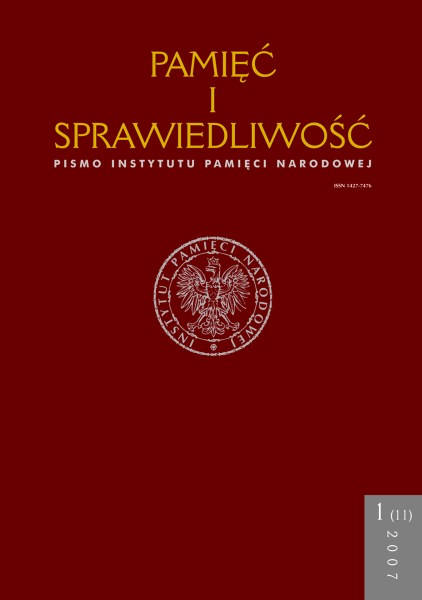Kilka uwag na temat genezy pojęcia „ludobójstwo”
Pamięć i Sprawiedliwość, Tom 11 Nr 1 (2007), strony: 373-382
Data publikacji: 2007-12-30
Abstrakt
Life of Rafaël Lemkin (1900–1959), born in Bezwodne (“Kresy” – polish Eastern Borderlands) was determined by his origins, his experience during the wars and his passion for law. Born in a Jewish family that had been immerged in the conflict between Germans and Russians, Lemkin’s fi rst idea was to dedicate
himself to literary studies, but the assassination in Berlin of Talaat Pacha, one of the instigators of the Armenians’ massacre in Turkey in 1915, led him to study law in order to promote the protection of minorities and to offer them rights that would ensure them decent living conditions. The young lawyer was soon confronted with many drawbacks both in Poland and at the international level. Thus his whole life made one with his plan to create an international law that would establish responsibility for the states.
A soldier in 1939, he became a refugee fi rst in Lithuania and then in Sweden, before managing to reach the United States where he got on with his fi ght, which became even more urgent because of the discrimination and persecution policy carried out against the European Jews by the Nazi regime, which ruled the old continent. That is how he was led to coin the Genocide concept to define this policy. A long time ahead of the historians, he pointed out the significance of the economic, fi nanciary and social measures that progressively open the path to extermination. Lemkin pled for a broad view of things: for him extermination began with destruction of the cultural elements of the minorities or of the peoples under
Nazi rule.
In 1948, he succeeded in having the recently established United Nations Organisation adopt a convention that declared genocide a crime under international law.
Jean-Louis Panné, who is currently editing in France an anthology of Lemkin’s writings, delineates here for us Lemkin’s personal and intellectual career, with an emphasis on the important legacy left to mankind by this Polish man who would deserve to be better known. Lemkin died in 1959, exhausted by a struggle that led
him more than once on the fringe of misery. Rafaël Lemkin, who lived through most tragic days of the twentieth century, is not only a witness, he is one of those great men who dedicated their heart and soul to elaborate an international law.
Inne teksty tego samego autora
- Jean-Louis Panné, Urszula Paprocka-Piotrowska, Francuscy i polscy jeńcy wojenni. Braterstwo doświadczeń i świadectwa , Pamięć i Sprawiedliwość: Tom 8 Nr 2 (2005)
 Język Polski
Język Polski
 English
English
 Deutsch
Deutsch
 Français (France)
Français (France)
 Italiano
Italiano
 Русский
Русский


 PDF
PDF
